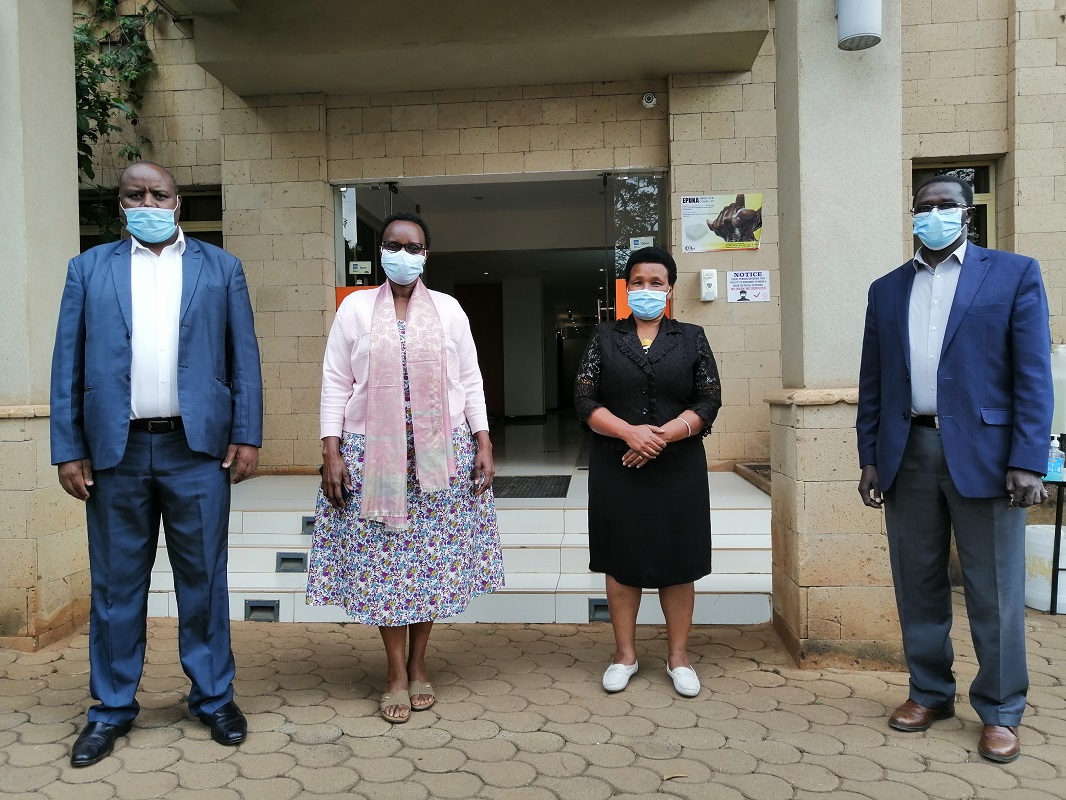
Kenyan Scientists Embark on Synthetic Biology Research
September 9, 2020| |
The first-ever government-funded research project on Synthetic Biology in Kenya has been launched. The project, funded under the country's National Research Fund, will employ synthetic biology innovations in addressing intractable challenges in food security and healthcare.
Led by a multidisciplinary team of local researchers, the project titled Developing low-cost diagnostic tools and biosensors for rapid detection of crop and human pathogens in Kenya aims at harnessing the power of synthetic biology to provide viable solutions to delayed disease surveillance and intervention in the country. The team is composed of Drs. Margaret Karembu, Director ISAAA AfriCenter, who is the Principal Investigator (PI); Benson Mburu, Principal Scientist at the National Commission for Science, Technology & Innovation; Margaret Muturi, Senior Lecturer at Kenyatta University; and Professor Douglas Miano, a molecular virologist at the University of Nairobi.
Synthetic biology is a rapidly emerging interdisciplinary field with major potential for socio-economic growth and development. The technology offers practical solutions to challenges cutting across human and livestock health, agriculture, industry, environmental management, and restoration. In recent years, synthetic biology has provided a toolbox of well-defined genetic parts and exciting permutations for building new biochemical functions. This has opened up a vast world of possibilities in using existing and/or engineered biological building blocks to create useful, functional systems and products. In Kenya and indeed Africa, synthetic biology has great potential to contribute to national development agenda by anchoring a sustainable bioeconomy. This will be done by leveraging low-cost, rapid diagnostic kits and biosensors in support of health and agricultural systems, as well as supporting environmental conservation and restoration programs.
The inaugural project will develop sensing devices for use in detection of crop and human pathogens. Besides, it will go a step further to explore policy and legal frameworks required in adopting synthetic biology innovations in the country, while building a shared public understanding on the opportunities and benefits of the technology through effective communications.
The team will work closely with Professor Paul Freemont's team at Imperial College London (UK) in establishing technology transfer models compliant with both countries' standards and regulations. "All devices will be validated and approved as fit-for-use through relevant state regulatory agencies before deployment," said Dr. Karembu. Ultimately, the 3-years' research project will contribute towards revitalizing and harnessing Science, Technology, and Innovation for Kenya's prosperity and global competitiveness as stipulated in the national development agenda. The project will also inspire more government and private sector investments in synthetic biology, providing innovative and adaptable solutions to crucial societal challenges.
For more on the project contact the project PI, Dr Margaret Karembu, at mkarembu@isaaa.org. You can also join Africa's Synthetic Biology conversations at AAASynBio.
| |
You might also like:
- Scientists Highlight Responsible Advancement, Safe Use of Synthetic Biology
- East Africa Gears for Synthetic Biology
- Synthetic Biology MOOC Teaches How to Make DIY DNA
Biotech Updates is a weekly newsletter of ISAAA, a not-for-profit organization. It is distributed for free to over 22,000 subscribers worldwide to inform them about the key developments in biosciences, especially in biotechnology. Your support will help us in our mission to feed the world with knowledge. You can help by donating as little as $10.
-
See more articles:
-
News from Around the World
- 3rd Asian Short Course on Agri-biotech, Biosafety Regulation, and Communication
- ISAAA Kicks Off Discourses on Regulatory Approaches for Animal Biotech
- Kenyan Scientists Embark on Synthetic Biology Research
- US EPA Proposes to Ease Up Regulations on Certain Biotech PIPs
- Australian OGTR Receives License Application for Field Trial of GM White Clover
- Plant Protein Discovery to Help Plants Tolerate Climate Change and Reduce Need for Fertilizers
-
Research Highlights
- International Research Team Discovers How Plants Shut the Door on Infection
- Meta-analysis Investigates Effect of Bt Crops on Soil Invertebrates
-
Plant
- Scientists Publish qPCR Method for Commercial Gene-Edited Canola
- New Bicistronic TALENs Enhance Genome Editing
- Study Shows OsCRS2 Vital for Chloroplast Development in Rice
-
Health
- Most Comprehensive Map of SARS-CoV-2 Genomic Structures Now Published
- Nigerian Scientists Identify Seven Lineages of SARS-CoV-2
-
Read the latest: - Biotech Updates (January 28, 2026)
- Gene Editing Supplement (January 28, 2026)
- Gene Drive Supplement (February 22, 2023)
-
Subscribe to BU: - Share
- Tweet

